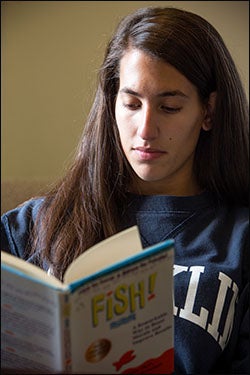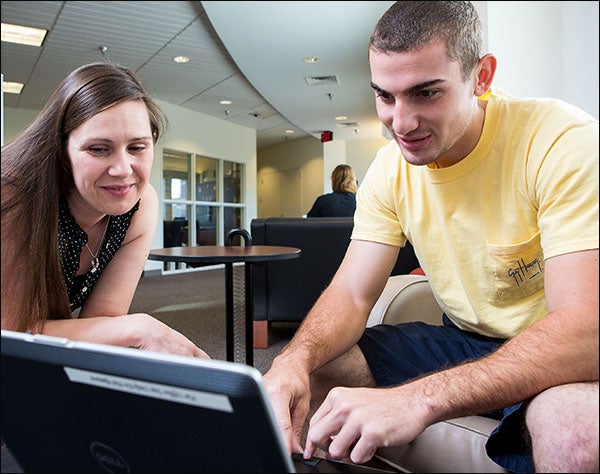SHARING KNOWLEDGE
Curriculum eases transition for students with learning differences
Faculty members at East Carolina University have developed and released free curriculum materials designed to help high school students with learning differences make a successful transition to college.
The curriculum – all available online – is an outgrowth of six years of experience with Project STEPP, a program at ECU for students with learning disabilities.
“College is a time of tremendous change and adjustment for all students but even more so for students with learning disabilities who may be accustomed to receiving external support from their high schools and families,” said Emily Johnson, Project STEPP associate director and transition specialist.

Mary Ciampi enjoys a quiet moment at the Project STEPP study area in Joyner Library.
“At ECU, we know that students with learning differences can be successful in college but that road is even more smooth if they begin planning ahead in high school.”
The transition curriculum contains eight modules, each with fully developed lesson and activity plans. Modules focus on subjects including the differences between high school and college, balancing academic and social life, organization and time management, communicating with faculty and using technology. Each module includes lecture slides, teacher notes and student activity handouts.
Lessons and activities were designed with a curriculum assistance class environment in mind to support college-bound students with learning disabilities. However, teachers are encouraged to adapt materials as needed for their specific setting and student population. The materials could also be adapted by parents for use in home settings if the content is not being covered in a student’s high school class. The materials can be accessed athttp://www.ecu.edu/cs-acad/stepp/curriculum.cfm.
“These preparations can help them through the process of identifying their college options, learning the specifics of what each campus offers, and beginning to explore and engage with their new school before starting classes,” Johnson said.
Starting college classes was an eye-opening experience for ECU junior Marell Cook, who has dyslexia. She graduated from The Fletcher School in Charlotte – a school dedicated to serving individuals with learning differences. There, her average class had fewer than eight students.
“To go from that to a huge lecture hall was definitely daunting,” she said. Cook also noticed that in college, class consisted of reviewing basic concepts but much of the learning occurred on students’ own time. That was different from high school, she said, where they learned in class and merely practiced after school.
Project STEPP provided the support she needed, Cook said, and helped her make that transition. The English major now gives back by serving as a tutor, holding weekly workshops and helping edit papers. She’s also developing a social website for students with learning differences who aren’t enrolled in programs like Project STEPP, so that resources can be shared and no one feels they’re “doing it alone.”
ECU’s Project STEPP is one program of a three-campus UNC College STAR initiative. College STAR (Supporting Transition, Access and Retention) is a project of the University of North Carolina system designed to support students with learning differences and to disseminate best-practice teaching methods for promoting the success of students with varied learning styles and backgrounds to faculty members. Additional College STAR programs are located at the University of North Carolina Greensboro and Appalachian State University. Each participating campus has designed a model that weaves together direct student support targeted to specific populations as well as instructional support for faculty across the campus.
At ECU, Project STEPP focuses on students with specific learning disabilities such as dyslexia, dysgraphia and dyscalculia. It is estimated that between 3 and 9 percent of students on college campuses have some kind of learning difference, many of which are identified while the student is in K-12 school.
College STAR is funded by the Oak Foundation of Geneva, Switzerland, and the N.C. GlaxoSmithKline Foundation.

Emily Johnson, Project STEPP associate director and transition specialist, works with ECU student Matthew Lahey at the Project STEPP center.